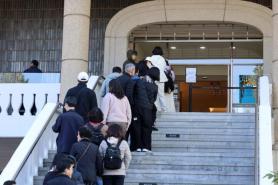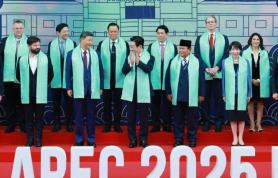
SEOUL, October 27 (AJP) - As South Korea prepares to host the 2025 APEC Economic Leaders' Meeting in Gyeongju this week, global attention is fixed on the expected encounter between U.S. President Donald Trump and Chinese President Xi Jinping. But away from the media spotlight, many of the region's other leaders are arriving with their own priorities — from digital transformation and green energy to demographic change and inclusive growth.
According to APEC, this year's discussions will center on the three pillars of "Connect, Innovate, and Prosper," building on ongoing work to strengthen digital transformation, respond to demographic shifts, and promote sustainable development. The Gyeongju meetings are also expected to explore ways to expand cooperation in artificial intelligence, small business support, and the creative economy.
This year's summit is being held under the theme "Building a Sustainable Tomorrow: Connect, Innovate, Prosper." South Korea's Ministry of Foreign Affairs said the agenda is designed to address "the social and economic shifts brought by technology and aging populations" while fostering innovation and inclusive development across the region.
Japan's Prime Minister Takaichi Sanae is expected to focus on the challenges of an aging society and labor shortages, issues that Japan has been confronting for years. Singapore's Prime Minister Lawrence Wong is likely to emphasize digital connectivity and regional supply-chain resilience, continuing Singapore's long-standing role as a bridge for economic cooperation in Southeast Asia. Malaysia's Prime Minister Anwar Ibrahim has consistently promoted the formalization of informal economies, echoing APEC's goal of making growth more inclusive.
From Latin America, Mexico's new president, Claudia Sheinbaum Pardo, is attending her first major multilateral meeting since taking office, with an emphasis on sustainable energy and green transition. Chile's President Gabriel Boric and Peru's President Dina Boluarte are also in attendance, maintaining Latin America's active participation in APEC policy discussions.
In a statement to Aju Press, the Peruvian Embassy in Seoul said on Monday that Peru "fully shares the principles and values of APEC, particularly the promotion of trade and investment liberalization," adding that it continues to advance the priorities it set during its 2024 chairmanship — including the use of clean hydrogen, reducing food loss and waste, and supporting the transition of small and medium-sized enterprises from the informal to the formal economy.
The embassy also said it "commends Korea's focus on demographic change, artificial intelligence, and cultural and creative industries," underscoring both countries' efforts to make APEC more relevant to everyday citizens.
New Zealand Prime Minister Christopher Luxon, who is traveling to South Korea after visiting Malaysia, said in an October 22 statement published on the Beehive, the official website of the New Zealand Government, that his goal is to "deepen relationships with regional leaders and unlock new opportunities for New Zealand." He described the Indo-Pacific as "the world's most economically dynamic region with nine of our top ten trading partners" and said that building effective partnerships across it "is a top priority for this government."
Indonesia's President Prabowo Subianto is expected to push for closer cooperation on infrastructure and energy transition, while Australia's Prime Minister Anthony Albanese is likely to focus on green technology and free trade — both recurring themes in Canberra's regional agenda.
Copyright ⓒ Aju Press All rights reserved.




